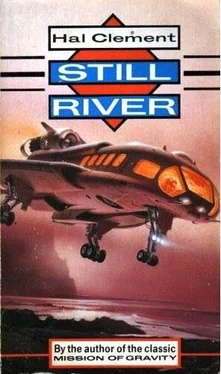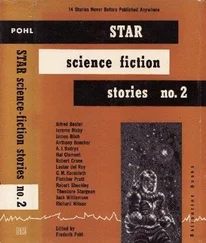It did not seem a dangerous situation, particularly. He had lost his personal sense of direction for a moment, but there was enough gravity to tell him which way was down, after a little careful checking with loose items he had on board. He could not see outside, of course, being completely buried, but he was sure the burial could not be very deep. If the robot’s power would not push it through the deposit without damaging the hull, he could go outside himself and do some digging—with due precaution against being blown away again when he did get through and the air was once more free to move. Once was quite enough, even weightless.
At this point Molly, of all people, asked whether there were any evidence of what had happened to the mapping robots. Since it seemed clear that the tiny objects could never have triggered an event like this—their automatic controls would have prevented them from touching the walls, and their size would have kept them from changing wind speed significantly in any passage large enough for his own machine—he replied truthfully, he felt, that no evidence was yet forthcoming. He preferred to say nothing about his present minor predicament until he was out of it, of course.
He then applied driving power, gradually increasing the thrust until he began to worry about the strength of the robot’s shell. There was no motion that he could feel in his craft or see in the surrounding sediment.
He thought briefly again of digging, but then remembered that the hatch opened outward. He did not even try to move it. He was strong—nearly as strong as Molly, in spite of the feeble gravity of his home world—but knew his limitations too well for that.
After a few seconds more of thought, he returned to the control keys, concentrating this time on attitude rather than motion. It proved possible, finally, to rotate the robot on its long axis—Joe remembered, with a slight shudder, that he had briefly considered giving the machine an elliptical rather than a circular lateral cross section merely for appearance’s sake—and within a few minutes his equipment was boring its way gently out of its tomb.
Once free, he reported in full, including his reasons for doubting that this was what could have happened to the small mappers. “I’m a little bit unsure about whether to go back through this mess and continue checking this branch, or check out one of the others,” he concluded. “I am sorry to say I dug my way out on the downward side of the block without thinking.”
“You were thinking better then than you are now!” snapped Carol. “Your next maneuver is to get back out of the tunnels into the open and recall your machines. Count them out where you’re safe, and incidentally where their radars will pick up Molly and me when we get through. Leave them out there, or most of them. Spread them to cover as much of that inner surface as possible. When that’s done, you might take a few and go check one of your dead tunnels, if you like—well, of course you have to—but don’t get all your mappers committed to an area that seems to be eating them, just yet. Get them out of there. I’m very glad we know about what this mud or clay can do in a high wind and no weight, and we will be extremely careful when we reach tunnels that seem to be made of it, but untie the knots in them before you stretch your arms any farther.”
Molly sympathized with her companion, though she could never have brought herself to be that emphatic with Joe. She added a quiet “It would be nice to know just how many of those little mappers really are left” to Carol’s diatribe, and waited for his answer, which was quite predictable.
“You are quite right; I should have withdrawn the other robots before starting this investigation. I’ll go back and take care of that immediately.”
“And please tell us when you’re out in the open again,” added the Human.
“There are no more such constrictions on the way out, but I will certainly report. It will take a little while to make even an approximate count of the robots; I should have included provision for individual monitoring.”
“You can’t either foresee or take care of everything, Joe. A fiction writer, years ago on my home world, complained that the trouble with writing adventure stories was that adventures happened only to the incompetent and he or she—I don’t remember which it was—felt unhappy writing about incompetent characters. The readers, he felt, were bound to recognize each mistake as it happened and sneer at them. It just doesn’t happen that way; if it did, none of us would make mistakes—and life could actually become boring. Horrid thought. Go on back to the hollow, Joe, check your machines, and keep in touch with us. Even there, things might happen that none of us has foreseen. I think we’re in more danger at the moment than you are, but I’m far from certain of it.”
Ten hours later, Charley reported a gravity of thirty in the usual units; presumably he was over halfway to the center. Jenny had found fundamental genetic biochemistry suggesting eight different planetary origins in the specimens she herself had found and brought back to the tent; there seemed no reasonable doubt that Enigma had been repeatedly seeded, and ordinary evolution been busily at work developing a fascinating ecology of the results. She was still working. The original atmosphere problem had been almost forgotten; objectively speaking, the guess that had been made toward a solution was still in the hypothesis class, but the flood of new questions had left the group willing to accept it so their attention could be freed for other things.
Joe had found that many of his robots were indeed missing, but fewer than he had guessed; there were still three hundred ten in service. This, of course, did not lesson the problem of what had happened to the other two hundred or so; he would long since have returned to the caves in search of them if another difficulty had not developed.
Molly and Carol were still following a river of unknown size. Gravity suggested that they might be nearly halfway to the inner surface by now, according to Carol’s observations; but Molly was unable to check them.
Her vision had been getting progressively worse. The urge to blink and squint had increased, the blurring had grown more and more extreme, and occasionally she could feel liquid running down her cheek—slowly, and only when an accumulation that made seeing hopeless had finally been dislodged from her cornea by frantic blinking and head shaking. She had nothing to serve as a mirror and could not tell whether the liquid was ordinary tears or something else. Carol, who could see the drops, was not familiar enough with Human physiology to report anything useful. Her color sense was different enough from Molly’s to make even basic description quite useless; there was no way for the translator to handle color symbols, and it simply reported the fact.
Both carried elementary first aid equipment in their armor, of course. Carol’s was, except for purely mechanical items like wound dressings, incompatible with Human chemistry. Molly’s seemed inappropriate to the present trouble, but she lacked the medical knowledge to offer more than a guess at her present trouble.
The Shervah could guess equally well, and with more conviction. “I told you it was insane to take that bath. School only knows what was in that part of the river besides water.”
“But I didn’t get any of it in my eyes. I had them shut tightly when I submerged.”
“You didn’t get much of it in your eyes. What’s its vapor pressure at the temperature of that bath? What does it do to your chemistry? How much does it take to destroy your eyes?”
“Since I don’t know what it is…” “Precisely. All right, I’m sorry to overtrack; you know as well as I do how silly it all was—and I know as well as you do that I might have done the same under the same drive. Let’s be reasonable, if you’ve been poisoned by something in that river, the stuff is water soluble. You will have to decide whether you can spare enough water from your armor system, and open your helmet long enough in this environment, to try swabbing your eyes out with a water-soaked dressing. I know it may be too late, and whatever happened will have to run its course; I know whatever caused the trouble may still be around us as vapor. I have wound dressings that will hold water if you decide to try it—so do you, I imagine.”
Читать дальше












